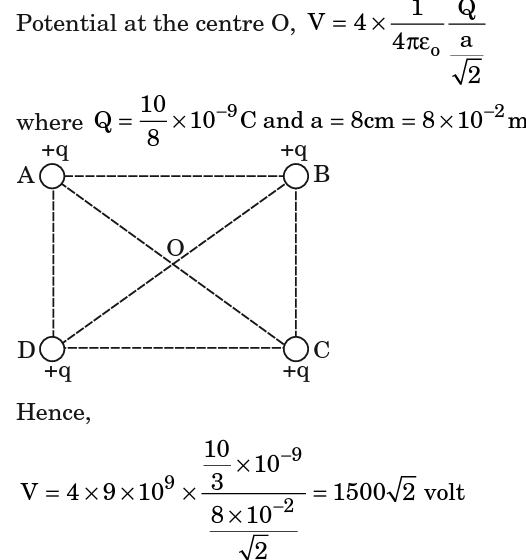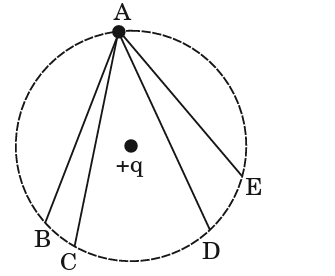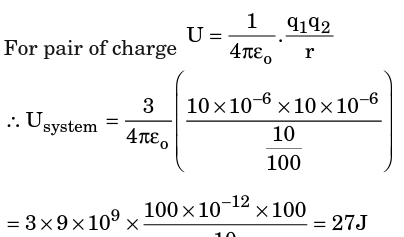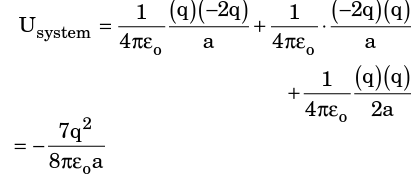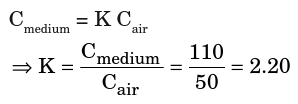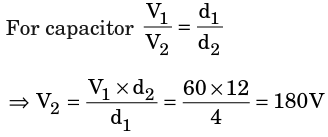Hi CUET aspirants, Welcome to Amans Maths Blogs (AMBIPi). In this post, you will get CUET Physics Questions Electrostatic Potential and Capacitance AMBIPi. This CUET Physics Questions Electrostatic Potential and Capacitance. Before solving these CUET Physics questions, you must read CUET Physics Notes, which helps you to revise CUET Physics Syllabus and then you must need to solve CUET Previous Years Questions Papers.
CUET Physics Mock Test
CUET Physics Question No: 1
A charge q is placed at the centre of the line joining two equal charges Q. The system of the three charges will be in equilibrium, if q is equal
Option A : -Q/2
Option B : -Q/4
Option C : +Q/4
Option D : +Q/2
Show/Hide Answer Key
Option B: -Q/4 Suppose in the following figure, equilibrium of charge B is considered. Hence for it’s equilibrium
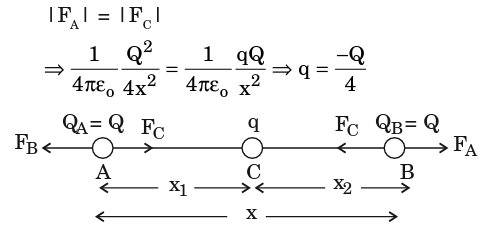
CUET Exam Physics Question No: 2
Inside a hollow charged spherical conductor, the potential
Option A : is constant
Option B : varies directly as the distance from the centre
Option C : varies inversely as the distance from the centre
Option D : varies inversely as the square of the distance from the centre.
Show/Hide Answer Key
Option A: is constant
Inside a hollow charged spherical conductor, the potential is constant.
CUET UG Physics Question No: 3
Charges of +10/3 × 10–9 C are placed at each of the four corners of a square of side 8 cm. The potential at the intersection of the diagonals is
Option A : 150√2 volt
Option B : 1500√2 volt
Option C : 900√2 volt
Option D : 900 volt
Show/Hide Answer Key
Option B: Potential at the centre O
CUET Domain Subject Physics Question No: 4
In the electric field of a point charge q, a certain charge is carried from point A to B, C, D and E. Then the work done
Option A : Is least along the path AB
Option B : Is least along the path AD
Option C : Is zero along all the paths AB, AC, AD and AE
Option D : Is least along AE
Show/Hide Answer Key
Option C: Is zero along all the paths AB, AC, AD and AE
ABCDE is an equipotential surface, on equipotential surface no work is done in shifting a charge from one place to another
CUET BSc Physics Question No: 5
A conductor with a positive charge
Option A : Is always at +ve potential
Option B : Is always at zero potential
Option C : Is always at negative potential
Option D : May be at +ve, zero or-ve potential
Show/Hide Answer Key
Option D: May be at +ve, zero or-ve potential
May be at positive, zero or negative potential, it is according to the way one defines the zero potential.
CUET Entrance Exam Physics Question No: 6
If E is the electric field intensity of an electrostatic field, then the electrostatic energy density is
Option A : E
Option B : E2
Option C :1/E2
Option D : E3
Show/Hide Answer Key
Option B : E2
Electrostatic energy density dU/ dV = 1/2 Kℇ0 E . . dU / dV ∞E2
CUET Exam Question No: 7
Three particles, each having a charge of 10 μC are placed at the corners of an equilateral triangle of side 10 cm. The electrostatic potential energy of the system is
(Given 1/4𝛑30 = 9 x 109 N – M2/C2 )
Option A : Zero
Option B : Infinite
Option C : 27 J
Option D : 100 J
Show/Hide Answer Key
Option C: 27J
CUET Physics Practice Questions No: 8
Two equal charges q are placed at a distance of 2a and a third charge –2q is placed at the midpoint. The potential energy of the system is
Option A : Q2/ 8𝛑30a
Option B : 6q2/ 8𝛑3oa
Option C : 7q2/ 8 𝛑3oa
Option D : 9q2/ 8 𝛑 3oa
Show/Hide Answer Key
Option C: 7q2/ 8 𝛑3oa
CUET Physics Sample Paper Question No: 9
A parallel plate condenser has a capacitance 50 μF in air and 110 μF when immersed in an oil. The dielectric constant ‘K’ of the oil is
Option A : 0.45
Option B : 0.55
Option C : 1.10
Option D : 2.20
Show/Hide Answer Key
Option A: 0.45
Potential at any point inside the charge spherical conductor equals to the potential at the surface of the conductor i.e. Q/R
CUET Physics Mock Test Question No: 10
The capacity of parallel plate condenser depends on
Option A : The type of metal used
Option B : The thickness of plates
Option C : The potential applied across the plates
Option D : The charge on condenser will reduce to one third
Show/Hide Answer Key
Option D: The charge on condenser will reduce to one third
The capacity of parallel plate condenser depends on the separation between the plates C ∝ 1/d
CUET Physics Question No: 11
The potential to which a conductor is raised, depends on
Option A : The amount of charge
Option B : Geometry and size of the conductor
Option C : Both (a) and (b)
Option D : Only on (a)
Show/Hide Answer Key
Option C: Both (a) and (b)
V = Q/C where Q = The amount of charge C = Capacitance which depends on geometry and size of conductor
CUET Exam Physics Question No: 12
If the dielectric constant and dielectric strength be denoted by K and x respectively, then a material suitable for use as a dielectric in a capacitor must have
Option A : High K and high x
Option B : High K and low x
Option C : Low K and low x
Option D : Low K and high x
Show/Hide Answer Key
Option A: High K and high X
High K means good insulating property and high x means able to withstand electric field or electric potential gradient to a higher value.
CUET UG Physics Question No: 13
When air is a capacitor is replaced by a medium of dielectric constant K, the capacity.
Option A : Decreases K times
Option B : Increases K times
Option C : Increases K2 times
Option D : Remains constant
Show/Hide Answer Key
Option B: Remains Constant
CUET Domain Subject Physics Question No: 14
The capacity of a parallel plate capacitor increases with the
Option A : Decrease of its area
Option B : Increase of its distance
Option C : Increase of its area
Option D : None of the above
Show/Hide Answer Key
Option C: Increase of its area Capacity of parallel plate capacitor C = ε0A / d
CUET BSc Physics Question No: 15
A capacitor of capacity C has charge Q and stored energy is W. If the charge is increased to 2Q, the stored energy will be
Option A : 2W
Option B : W/2
Option C : 4W
Option D : W/4
Show/Hide Answer Key
Option C: W/4
CUET Entrance Exam Physics Question No: 16
The distance between the plates of a parallel plate condenser is 4 mm and potential difference is 60 volts. If the distance between the plates is increased to 12 mm, then
Option A : The potential difference of the condenser will become 180 volts
Option B : The P.D. will become 20 volts
Option C : The P.D. will remain unchanged
Option D : The charge on condenser will reduce to one third
Show/Hide Answer Key
Option A: The potential difference of the condenser will become 180 volts
CUET Exam Question No: 17
The true statement is, on increasing the distance between the plates of a parallel plate condenser
Option A : The electric intensity between the plates will decrease
Option B : The electric intensity between the plates will increase
Option C : The electric intensity between the plates will remain unchanged
Option D : The P.D. between the plates will decrease
Show/Hide Answer Key
Option C: The electric intensity between the plates will remain unchanged. Electric field between the plates of a parallel
CUET Physics Practice Questions No: 18
Two small spheres each carrying a charge q are placed r metre apart. If one of the sphere is taken around the other one in a circular path of radius r, the work done will be equal to
Option A : Force between them × r
Option B : Force between them × 2𝛑r
Option C :Force between them / 2𝛑r
Option D : zero
Show/Hide Answer Key
Option C: Force between them / 2𝛑r
Because the charges are produced due to induction and moreover the net charge of the condenser should be zero.
CUET Physics Sample Paper Question No: 19
Two charged spheres of radii 10 cm and 15 cm are connected by a thin wire. No charge will flow, if they have
Option A : The same charged on each
Option B : The same potential
Option C : The same energy
Option D : The same field on their surfaces
Show/Hide Answer Key
Option B: The same potential
Because current flows from higher potential to lower potential.
CUET Physics Mock Test Question No: 20
If a unit positive charge is taken from one point to another over an equipotential surface, then
Option A : work is done on the charge
Option B : work is done by the charge
Option C : work done is constant
Option D : No work is done
Show/Hide Answer Key
Option D: No work is done
On the equipotential surface, electric field is normal to the charged surface (where potential exists) so that no work will be done.

